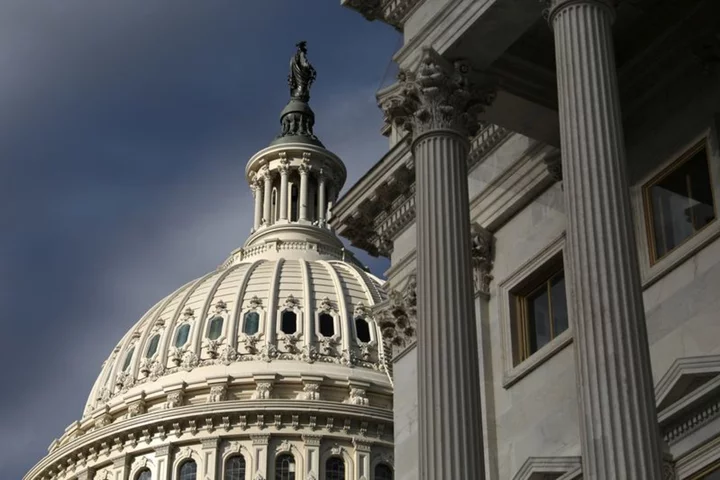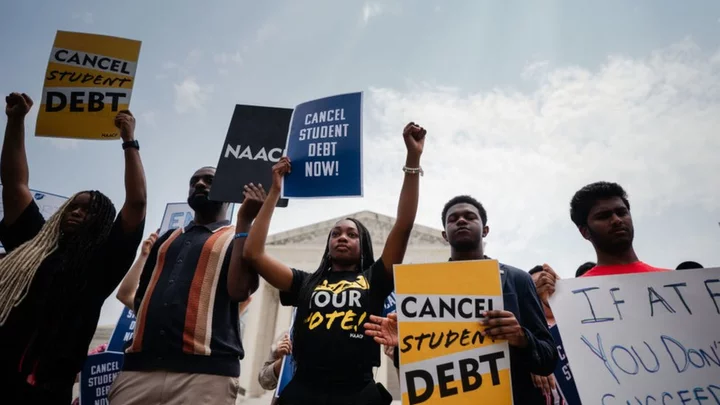By David Morgan
WASHINGTON (Reuters) -The Republican-controlled U.S. House of Representatives is due to begin voting this week on a series of spending bills that take aim at culture-war targets, putting it on a collision course with the Democratic-led Senate and increasing the odds of a government shutdown come October.
Before leaving for their August recess on Friday, House lawmakers will consider two Republican appropriations bills that would provide $155.7 billion in discretionary spending for military construction and veterans affairs, and a total of $25.3 billion for agriculture, rural development and the Food and Drug Administration, for the fiscal year beginning Oct 1.
The measures also contain a number of measures that would limit abortion and transgender rights. Hardline conservatives from the House Freedom Caucus have proposed amendments that would address other hot-button topics including immigration, critical race theory and diversity.
The bills are the first of 12 appropriations measures that lawmakers have been crafting to cover every aspect of government funding.
While the House Appropriations Committee has approved 10 bills so far, all along party lines, its Senate counterpart has moved in an overwhelmingly bipartisan manner to mark up legislation at significantly higher spending levels.
The two chambers have until the end of the current fiscal year on Sept. 30 to pass their respective bills and hammer out compromise legislation or risk a partial government shutdown.
Representative Andy Biggs, a Freedom Caucus member, said he does not expect a shutdown and predicted that lawmakers would instead agree to a temporary funding measure known as a "continuing resolution" - though he said members of the hardline Republican group would not vote for one.
"I think that they'll ... run it out till December," Biggs told reporters on Tuesday.
Congress has not enacted 12 appropriations bills on time since fiscal 1997. Last year, spending bills were all crammed in to a sweeping omnibus measure totalling $1.7 trillion.
But Republican leaders could face a challenge even to pass Republican legislation in the House.
House Speaker Kevin McCarthy will have to convince Freedom Caucus members and other hardliners that appropriations bills will restrain discretionary government spending at a fiscal 2022 level of $1.47 trillion. That is less than he agreed to in a deal with Democratic President Joe Biden just two months ago.
Hardline conservatives warn that they will prevent this week's measures from reaching the floor by opposing the rule governing debate, unless they are assured that Republican leaders will not try to avoid the spending cuts they seek by redirecting previously allocated money to prop up allocations.
The White House has said that Biden would veto both of this week's House appropriations bills if they reached his desk. With House Democrats opposing them as well, McCarthy can afford to lose no more than four votes from his 222-212 Republican majority.
"If we don't agree with the outcome, we'll vote against the rule and do whatever we have to do," Representative Ralph Norman, a prominent Freedom Caucus member, said in an interview.
"Our vote is not just two, three people. It's 20-plus," he said.
Norman and other hardliners shut down the House floor last month to protest the $1.59 trillion spending levels for fiscal 2024 that were contained in the debt ceiling agreement negotiated by Biden and McCarthy.
Republican leaders had initially proposed shifting $115 billion from existing Democratic programs to party priorities in fiscal 2024, to compensate for the cuts sought by Freedom Caucus members. But hardliners want that money used instead to pay down a national debt of more than $31.4 trillion.
(Reporting by David Morgan in Washington; Editing by Scott Malone and Matthew Lewis)









